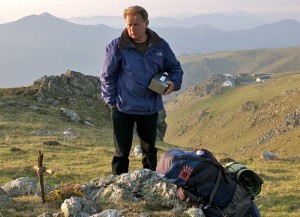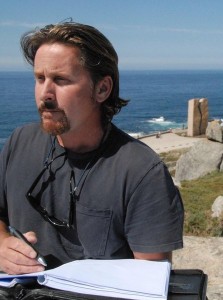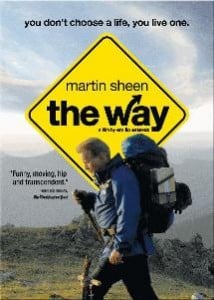Christopher Closeup Podcast – Guest: Emilio Estevez
“None of the characters went looking for God, but God found them.” Writer/Director/Producer Emilio Estevez recalled that reaction from a viewer when I interviewed him about his Christopher Award-winning movie, “The Way” (now available on DVD and Blu-ray).
 It tells the story of Tom (Martin Sheen), an American doctor whose son, Daniel (Emilio Estevez), dies while on the historical pilgrimage called the Camino de Santiago (or Way of St. James) in France and Spain. Tom had a strained relationship with Daniel, so he decides to complete the several-hundred-miles pilgrimage himself to honor his son’s memory. Along the way, he is joined by several other pilgrims who are walking the route for non-religious reasons as well. Their journey culminates in the Santiago de Compostela Cathedral where tradition maintains that the apostle James’ remains are buried. That’s where the pilgrims have more of an experience of God than they expected.
It tells the story of Tom (Martin Sheen), an American doctor whose son, Daniel (Emilio Estevez), dies while on the historical pilgrimage called the Camino de Santiago (or Way of St. James) in France and Spain. Tom had a strained relationship with Daniel, so he decides to complete the several-hundred-miles pilgrimage himself to honor his son’s memory. Along the way, he is joined by several other pilgrims who are walking the route for non-religious reasons as well. Their journey culminates in the Santiago de Compostela Cathedral where tradition maintains that the apostle James’ remains are buried. That’s where the pilgrims have more of an experience of God than they expected.
A key theme in “The Way” has to do with the sense of community that all of us need, but don’t always acknowledge. It’s made very clear in a humorous, but moving sequence in which the four pilgrims who’ve been spending virtually every waking and sleeping hour together decide to get separate rooms in a hotel so they can experience some alone time for a change. Ultimately, they discover they miss each other’s company and wind up congregating in Tom’s room.
The sense of community in that scene has a special resonance for Estevez. He explained to me on Christopher Closeup, “I’m very connected to my family, and one of the great salvations of my life is that I live very close to my parents. We talk daily. In this film, you have four pilgrims who are without family. They’re orphans in the world. Then they find each other and, in that moment, they create a refugio (a shelter) in that hotel room. They realize that instead of the things they thought they wanted – which was alone time or someone to do their laundry or room service – they need each other more than anything else. They need community more than anything else… That is ultimately the biggest theme of the film. These people get to the end of the road and they realize that is ultimately what connects them is their humanity and brokenness.”
Telling that kind of story in a way that integrates humor, joy, regret and forgiveness is a reflection of the journey Estevez has traveled. Though still associated with big Hollywood movies like “The Breakfast Club and “Young Guns,” he lives a much quieter life than most celebrities.
For instance, “The Way” is dedicated to his grandfather, Francisco, who moved to the U.S. in 1916 from a town in Spain that is 70 miles away from Santiago de Compostela. Estevez says, “He’s really been an inspiration to me in how he lived. He was a very humble man. He was a farmer and a winemaker. And I found myself being very connected to my grandfather even though I didn’t know him that well. He passed when I was 10 years old, so I didn’t get to spend a lot of time with him. Yet I find myself now living very much like my grandfather: farming the land and making my own wine. So here I am in southern California living a very Spanish lifestyle.”
 That humble lifestyle grounds Estevez as an artist and determines the kinds of stories he wants to tell as a writer, director and producer. He says, “I don’t write about outer space or car chases. I write about things that I know about, and I make films about relationships and about people. In the earlier films that I attempted to make, I was delving into areas that I knew nothing about and didn’t have any real connection to. As a result, the movies were terrible. They may have been funny, but they were juvenile and they didn’t come from my heart. I think with “Bobby” and “The Way,” these films are reflections of where I’m at right now in my life and the kinds of movies that I want to see.”
That humble lifestyle grounds Estevez as an artist and determines the kinds of stories he wants to tell as a writer, director and producer. He says, “I don’t write about outer space or car chases. I write about things that I know about, and I make films about relationships and about people. In the earlier films that I attempted to make, I was delving into areas that I knew nothing about and didn’t have any real connection to. As a result, the movies were terrible. They may have been funny, but they were juvenile and they didn’t come from my heart. I think with “Bobby” and “The Way,” these films are reflections of where I’m at right now in my life and the kinds of movies that I want to see.”
 Estevez’s genius as Director of “The Way” is made most clear in the sequence near the end of the film when the pilgrims finally arrive at the Cathedral. The architecture and artwork in churches like that were meant to inspire awe in people who came there, to remind us of the sheer grandeur and awesomeness of God. Estevez’s reaction was exactly the same.
Estevez’s genius as Director of “The Way” is made most clear in the sequence near the end of the film when the pilgrims finally arrive at the Cathedral. The architecture and artwork in churches like that were meant to inspire awe in people who came there, to remind us of the sheer grandeur and awesomeness of God. Estevez’s reaction was exactly the same.
He says, “It was extraordinary. We were not allowed access to the Cathedral at first. While we were along the Camino, we kept writing and calling and trying to get access. They said, ‘No, we’re not going to allow you to shoot. There’s another church you guys can access and use as a stand-in.’ And I said, ‘If we can’t get into the Cathedral, then we have no ending for the film.’ I think they believed we had this American sensibility that was going to poke fun at the Church, that it was going to be snarky, that it was not going to represent the Church or the Cathedral in a good light. And I said, ‘That couldn’t be further from the truth. Not only is this movie a representation of the Camino, but we believe it’s great PR for the Church.’ They continued to deny us. I asked the crew to light candles and to pray on it. And about 48 hours before we arrived in Santiago, they gave us permission not only to shoot in the Church, but to shoot the Mass, the tomb [of St. James], to film at the Portico de Gloria. It was a miracle that they allowed us to film there. Even though we only had a few hours to shoot, what you see on film is my awe and how I was inspired.”
To listen to my 11-minute interview with Emilio Estevez, click Christopher Closeup Podcast – Guest: Emilio Estevez











